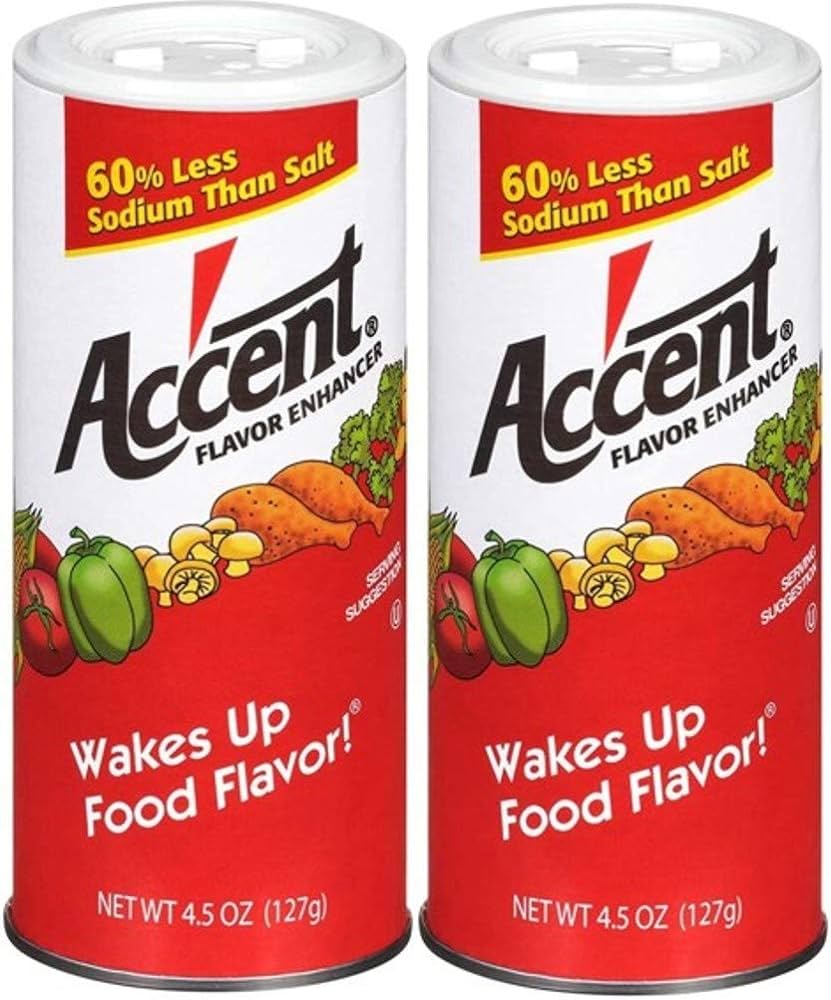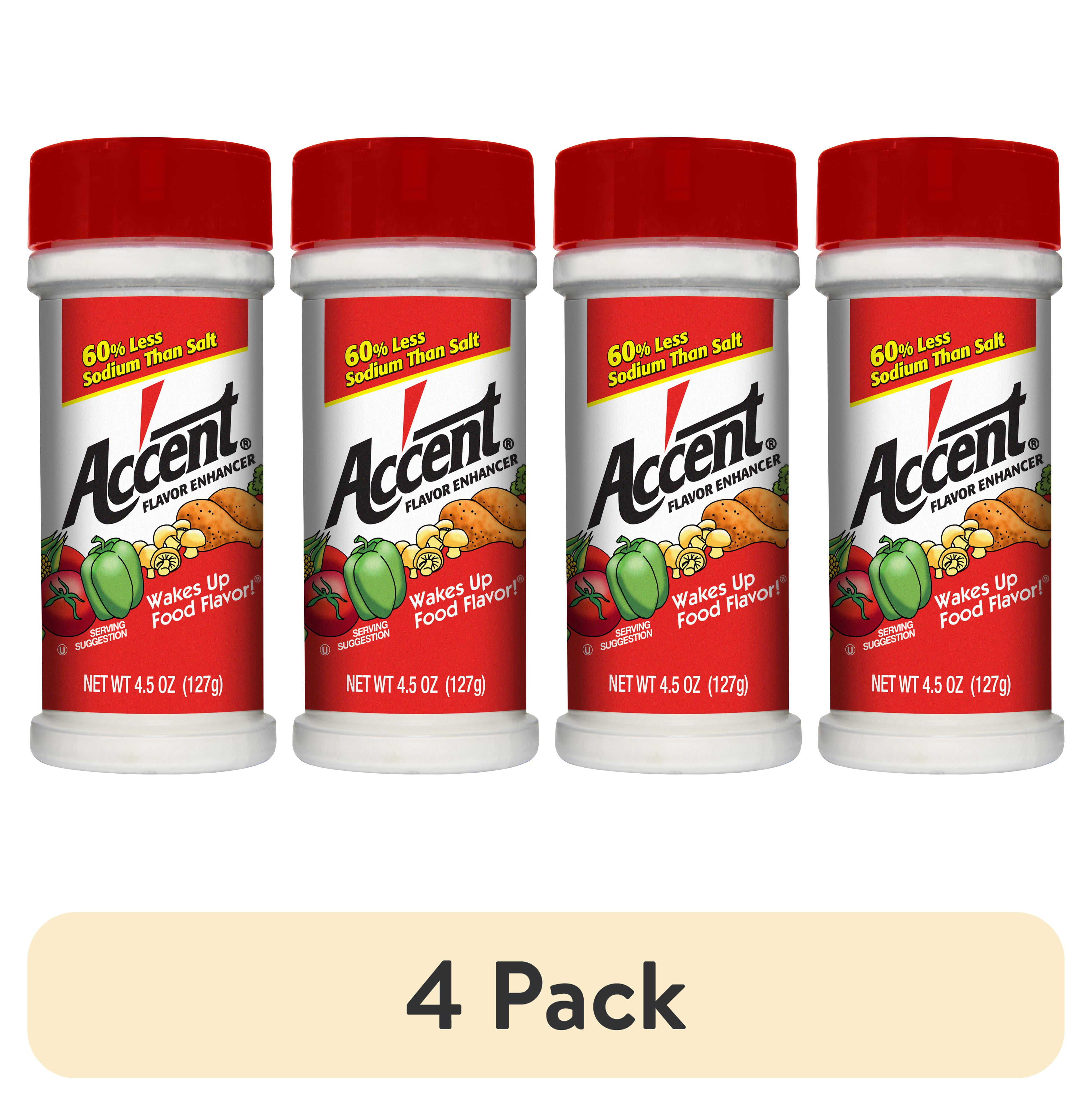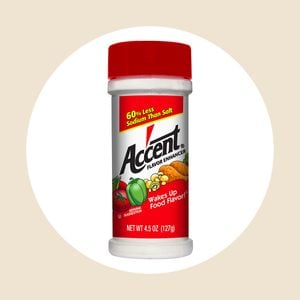
Introduction
What Are Flavor Enhancers And Their Role In Food
Flavor enhancers are specialized ingredients added to food to amplify or modify the existing taste profiles. They serve as an invisible hand, enhancing the flavors already present in the dish. These enhancers are designed to bring out the natural taste of the ingredients used in the recipe and create a more pleasant and satisfying eating experience.
The Mystery Behind Flavor Enhancers Like Accent
One such flavor enhancer that has been used by generations since 1947 worldwide is Accent seasoning. This seasoning produces a subtle and unique taste which is called umami in Japan. Umami is often described as a broth-like savory taste, adding depth and richness to dishes.
Accent seasoning contains a secret ingredient that allows it to have this remarkable flavor-enhancing ability. While the exact composition of Accent seasoning is not disclosed, it is known to contain monosodium glutamate (MSG). MSG is a flavor enhancer commonly used in Asian cuisines and is known for its ability to enhance the umami taste.
The use of Accent seasoning and other flavor enhancers has become popular in many kitchens around the world, as it can help to elevate the taste of various dishes. Whether you are a fan of accent seasoning or simply want to explore new flavors, understanding the role of flavor enhancers can enhance your culinary skills and bring new dimensions to your cooking.
MSG: The Magic Ingredient
What Is MSG
MSG, also known as monosodium glutamate, is a flavor enhancer commonly used in Asian cuisines. It is a concentrated form of glutamic acid, a nonessential amino acid that is naturally present in many ingredients and foods. MSG was first created in 1908 by Japanese chemist Kikunae Ikeda, who discovered its savory deliciousness and coined the term “umami” to describe it.
The Science Behind Msg’s Flavor-enhancing Properties
MSG works its magic by amplifying and intensifying the flavors already present in food. When dissolved in food, the glutamic acid in MSG enhances the umami taste, which is often described as a savory, broth-like flavor. This enhances the overall taste profile of the dish, making it more delicious and satisfying.
Compared to other flavor enhancers like Accent seasoning, MSG is widely used for its ability to bring out the natural flavors in food. While the exact composition of Accent seasoning is not disclosed, it is known to contain MSG as one of its ingredients.
Using MSG in your cooking can elevate the taste of various dishes and add new dimensions to your culinary skills. Whether you are a professional chef or a home cook, understanding the science behind flavor enhancers like MSG can help you create more flavorful and enjoyable meals.
Exploring Accent
Understanding The Composition Of Accent
Accent is a seasoning that has gained popularity for its ability to enhance the flavors in food. While the exact composition of Accent seasoning is not disclosed, it is known to contain monosodium glutamate (MSG) as one of its ingredients. MSG is a flavor enhancer commonly used in Asian cuisines, known for its ability to intensify the umami taste, often described as a savory, broth-like flavor.
Common Misconceptions About Accent
There have been misconceptions surrounding MSG and Accent seasoning. One common misconception is that MSG is harmful to health. However, numerous scientific studies have shown that MSG is safe for consumption when used in normal amounts. Another misconception is that Accent seasoning is purely made of MSG. While MSG is an ingredient in Accent seasoning, its exact composition may vary and may include other ingredients as well.
Overall, Accent seasoning can be a great addition to your culinary repertoire, helping to elevate the taste of various dishes. Understanding the science behind flavor enhancers like MSG can help you make informed choices in your cooking journey. Whether you decide to incorporate Accent seasoning or experiment with other flavor enhancers, exploring different ways to enhance the flavors in your food can bring a new level of enjoyment to your meals.

Where To Find Accent
Finding Accent In Grocery Stores
If you’re looking to purchase Accent seasoning, you can typically find it in the seasoning aisle of most grocery stores. It is a popular product and is widely available, making it easy to incorporate into your culinary endeavors.
Specialty Retailers And Online Options For Purchasing Accent
In addition to grocery stores, you may also find Accent seasoning at specialty retailers that offer a wide range of culinary ingredients. These specialty stores often have a diverse selection of seasonings and spices, making it a great place to explore different flavor enhancers. If you prefer the convenience of online shopping, you can also find Accent seasoning on various online platforms. This allows you to have the product delivered right to your doorstep, making it convenient for those who may not have easy access to physical stores.
Whether you choose to shop at a grocery store, a specialty retailer, or online, you’ll be able to find Accent seasoning and experience the flavor-enhancing benefits it has to offer.
The Umami Factor
Umami is often referred to as the fifth taste, beyond sweet, salty, sour, and bitter. It is a unique sensation that adds a sense of fullness and savoriness to food. The science behind umami lies in the presence of glutamate, a type of amino acid that is naturally found in various foods and beverages.
Glutamate is responsible for enhancing the flavors of certain foods, particularly those that are savory and meaty. It works by stimulating receptors on the tongue and enhancing the taste buds’ sensitivity to savory flavors. This amplification of flavor is what gives umami its distinct and enjoyable taste.
How MSG Amplifies Savory Flavors
Monosodium glutamate (MSG) is a flavor enhancer commonly used in cooking to intensify the umami taste. It is made by combining glutamate, which is naturally found in certain foods, with sodium. MSG has received some controversy due to misconceptions, but scientific research has shown that it is safe for consumption when used in moderate amounts.
The addition of MSG to food enhances the savory and meaty flavors, making the dish more flavorful and satisfying. It is commonly used in Asian cuisines, such as Chinese, Japanese, and Korean dishes. MSG can be added directly to dishes during cooking or used as a seasoning in the form of Accent seasoning.
The Concept Of Umami In The Culinary World
Umami has gained recognition and appreciation in the culinary world, with many chefs incorporating umami-rich ingredients to enhance their dishes. Along with glutamate-rich ingredients, foods such as mushrooms, tomatoes, soy sauce, and aged cheeses are known for their umami properties.
By understanding the concept of umami and how it enhances flavors, chefs and home cooks can create more delicious and satisfying meals. Whether using natural sources of umami or flavor enhancers like MSG and Accent seasoning, the goal is to create a balanced and enjoyable eating experience.
Dispelling Myths
Examining The Myths And Misconceptions About MSG
MSG, or monosodium glutamate, has been the subject of many myths and misconceptions. Let’s take a closer look at some of these misconceptions and separate fact from fiction:
- Myth 1: People are allergic to monosodium glutamate. According to Ajinomoto, a leading manufacturer of MSG, there have been double-blind studies that have shown no consistent evidence of MSG causing allergic reactions. While some individuals may experience sensitivity to MSG, it is not classified as a true allergy.
- Myth 2: MSG is harmful to our health. Scientific research has shown that MSG is safe for consumption when used in moderation. The U.S. Food and Drug Administration (FDA) recognizes MSG as a generally recognized as safe (GRAS) ingredient. It is important to note that excessive intake of any food ingredient can potentially have negative effects, but when used responsibly, MSG poses no significant health risks.
Separating Fact From Fiction Concerning Accent
Accent seasoning, also known as MSG seasoning, is a popular flavor enhancer in cooking. Here are some key facts to help dispel any misconceptions about this seasoning:
- Fact 1: Accent seasoning is made from monosodium glutamate. Accent seasoning is a seasoning blend that contains monosodium glutamate, which is responsible for enhancing the savory flavors in food. It is a safe and effective way to add depth and richness to dishes.
- Fact 2: Accent seasoning is not the same as table salt. While Accent seasoning contains sodium, it is important to note that it is not the same as table salt. Accent seasoning is used in smaller quantities due to its potent flavor-enhancing properties, whereas table salt is primarily used for its taste and as a seasoning.
By understanding the truth about MSG and Accent seasoning, we can make informed decisions about their use in our cooking. While some individuals may have personal preferences or sensitivities, it is important to separate fact from fiction and embrace the flavor-enhancing benefits these seasonings can bring to our meals.

Health And Safety Concerns
Are There Any Health Risks Associated With MSG?
While there have been myths and misconceptions surrounding the health effects of MSG, scientific research has shown that MSG is safe for consumption when used in moderation. The U.S. Food and Drug Administration (FDA) recognizes MSG as a generally recognized as safe (GRAS) ingredient. It is important to note that excessive intake of any food ingredient can potentially have negative effects, but when used responsibly, MSG poses no significant health risks.
Recognizing The Fda’s Approval And Regulation Of MSG
The FDA considers the addition of MSG to foods to be generally recognized as safe (GRAS). It is important to note that the FDA has conducted extensive reviews of the scientific literature regarding the safety of MSG and has consistently affirmed its safety. The FDA also requires that MSG be listed on the ingredient label if it is added to a food product.
In summary, MSG is a safe flavor enhancer when used in moderation. The FDA has extensively reviewed the scientific literature and recognizes MSG as a safe ingredient. By understanding the facts and dispelling myths, we can confidently enjoy the flavor-enhancing benefits that MSG and Accent seasoning can bring to our meals.
Generated Text:
Alternatives To Accent
Natural Flavor Enhancers Available As Substitutes
There are several alternatives to Accent seasoning that can enhance the flavor of your dishes without the use of MSG. Here are some natural flavor enhancers you can explore:
- Herbs and spices: Fresh or dried herbs and spices can add depth and complexity to your recipes. Some popular options include basil, oregano, thyme, paprika, and cumin.
- Citrus juices and zest: Lemon, lime, and orange juices or zest can provide a tangy and refreshing element to your dishes. Their bright flavors can help elevate the taste of various recipes.
- Vinegar: Different types of vinegar, such as balsamic vinegar or apple cider vinegar, can add acidity and enhance the flavors in your meals. They can be used in marinades, dressings, and sauces.
Exploring Other Seasoning Options For Enhancing Flavors
If you prefer using seasoning blends rather than individual ingredients, here are some alternatives to Accent seasoning that you may consider:
- Garlic powder: Garlic powder can add a savory and umami flavor to your dishes. It works well in a variety of recipes, from soups and stews to marinades and rubs.
- Onion powder: Onion powder is another versatile seasoning that can enhance the flavors of your meals. It can be used in both cooked and raw dishes.
- Soy sauce: Soy sauce is known for its strong umami flavor. It can be used as a marinade or added to stir-fries, sauces, and dressings to boost the taste of your dishes.
By exploring these natural flavor enhancers and seasoning options, you can find alternatives to Accent seasoning that suit your taste preferences and dietary needs. Experiment with different combinations and quantities to discover exciting and delicious flavor profiles in your culinary creations.
Conclusion
The Importance And Impact Of Flavor Enhancers
Flavor enhancers like Accent seasoning play a significant role in elevating the taste of various dishes. They provide depth, complexity, and an umami flavor that can take your culinary creations to another level. While there may be differing opinions about the health effects of flavor enhancers, it is important to note that the FDA recognizes MSG as safe for consumption in moderate amounts.
Summary Of The Benefits And Uses Of Accent
Accent seasoning, which primarily consists of MSG and salt, is a popular flavor enhancer used in many recipes. It is known for its ability to add savory notes and elevate the flavors of meats, poultry, vegetables, soups, salads, and more. Some benefits of using Accent seasoning include:
- Enhancing the overall taste of dishes
- Adding depth and complexity to recipes
- Boosting the umami flavor
- Making meals more delicious and satisfying
While Accent seasoning is commonly used, there are also natural alternatives available for those who prefer to avoid MSG. Exploring other flavor enhancers like herbs, spices, citrus juices, vinegar, garlic powder, onion powder, and soy sauce can provide exciting and delicious alternatives to Accent seasoning.
By being aware of the options available and experimenting with different combinations, you can find flavor enhancers that suit your taste preferences and dietary needs in your culinary creations.
Frequently Asked Questions about What Is in Accent: Decoding the Mystery Behind Flavor Enhancers
Q: What exactly is Accent?
Accent is a popular flavor enhancer that is used to bring out the savory taste in the food. It is a product that contains monosodium glutamate (MSG), which is a naturally occurring flavor enhancer found in many foods.
Q: How does Accent enhance the flavor of food?
Accent works by stimulating the taste receptors on our tongues, enhancing the savory or umami taste in food. It doesn’t add any new flavors but enhances the existing flavors, making the food more delicious and satisfying.
Q: Is Accent safe to consume?
Yes, Accent is considered safe to consume by the U.S. Food and Drug Administration (FDA) when used as directed. It has been extensively studied and falls under the category of generally recognized as safe (GRAS) by the FDA.
Q: Can anyone consume Accent, or are there any restrictions?
Accent is generally safe for most people to consume. However, individuals who are sensitive or allergic to MSG may experience adverse reactions such as headaches, flushing, or sweating. It is advisable for such individuals to avoid products that contain MSG.
Q: Can Accent be used in all types of cuisine?
Yes, Accent can be used in a wide variety of cuisines and dishes. It is commonly used in Asian cooking, but it can also be used in soups, stews, sauces, marinades, and other savory dishes to enhance the flavor.
Q: Are there any alternatives to Accent if someone wants to avoid MSG?
Yes, there are alternatives available for individuals who want to avoid MSG. Some common alternatives include using natural flavor enhancers like herbs, spices, citrus juices, vinegar, or fermented foods to enhance the taste of dishes.
Q: How should Accent be used in cooking?
Accent should be used sparingly in cooking to enhance the flavors without overpowering them. It is recommended to start with a small amount, such as 1/2 teaspoon, and then adjust according to personal taste preferences.
Q: Is Accent suitable for vegetarians or vegans?
Yes, Accent is suitable for vegetarians and vegans as it does not contain any animal-derived ingredients. It is a flavor enhancer that can be used to enhance the taste of vegetarian or vegan dishes.
Q: Where can Accent be purchased?
Accent is widely available in grocery stores, supermarkets, and online retailers. It can be found in the spice or seasoning aisle, usually in small jars or packets.
Q: How long does Accent last? Does it expire?
Accent, like most seasonings, has a shelf life. It is recommended to check the expiration date on the packaging before use. When stored in a cool, dry place, Accent can typically retain its flavor for several years.
Q: Can Accent be used by individuals on a low-sodium diet?
Although Accent contains sodium, it can still be used in moderation by individuals on a low-sodium diet. Its strong flavor-enhancing properties mean that a small amount can be used, resulting in a reduced overall sodium intake compared to using larger amounts of salt.
Remember to consult with a healthcare professional if you have specific dietary restrictions or concerns regarding the use of Accent or any other food product.

Jake’s Street Food is a culinary gem located in the heart of the Submarine Museum area, offering a delectable array of tasty delights for locals and visitors alike. Whether you’re exploring the historic sites of Pearl Harbor or taking a shuttle to the USS Missouri or Pacific Aviation Museum, Jake’s Street Food is the perfect pit stop to refuel and indulge in the best food the area has to offer.
Our journey began with a passion for creating mouthwatering dishes that celebrate the vibrant flavors of local and global cuisine. Drawing inspiration from the bustling streets of culinary capitals around the world, Jake’s Street Food brings a fusion of bold flavors and innovative twists to classic street food favorites.